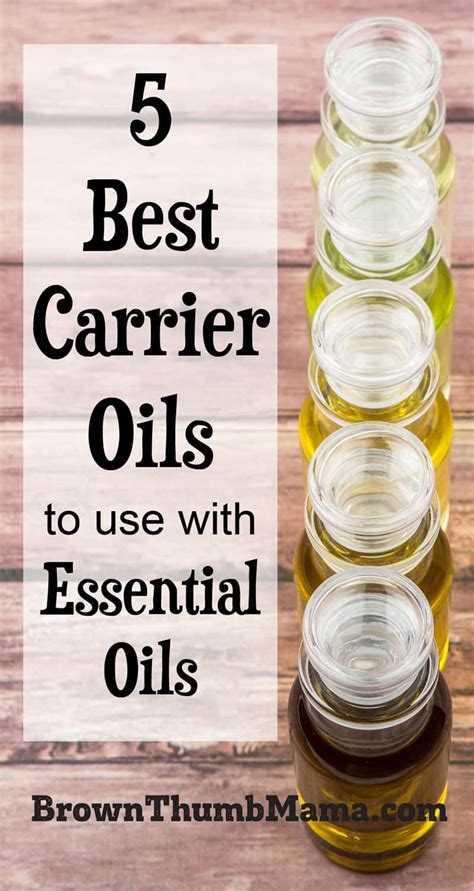Carrier oils are vegetable oils that are used to dilute essential oils before applying them to the skin. Essential oils are highly concentrated and can be irritating if applied directly to the skin. Carrier oils help to dilute the essential oils and make them safe for topical use.

Carrier oils are also used to enhance the absorption of essential oils. Essential oils are lipophilic, which means that they are attracted to oil. When essential oils are diluted in a carrier oil, they are more easily absorbed by the skin.
There are many different types of carrier oils available. Some of the most popular carrier oils include:
- Jojoba oil: Jojoba oil is a light, non-greasy oil that is similar to the sebum produced by the skin. It is a good choice for all skin types, including sensitive skin.
- Coconut oil: Coconut oil is a solid oil that melts at room temperature. It is a good choice for dry skin and can help to protect the skin from the elements.
- Sweet almond oil: Sweet almond oil is a light, hypoallergenic oil that is suitable for all skin types. It is a good choice for people who are new to using essential oils.
- Grapeseed oil: Grapeseed oil is a light, non-comedogenic oil that is good for oily skin. It can help to balance the skin and reduce the appearance of acne.
- Argan oil: Argan oil is a rich, nourishing oil that is good for dry and mature skin. It can help to reduce wrinkles and improve the skin’s elasticity.
How to Choose a Carrier Oil
When choosing a carrier oil, it is important to consider your skin type and the essential oils you are using. Some carrier oils are better suited for certain skin types than others. For example, jojoba oil is a good choice for all skin types, while coconut oil is a good choice for dry skin.
It is also important to consider the aroma of the carrier oil. Some carrier oils have a strong aroma, while others have a more neutral aroma. If you are using essential oils for aromatherapy, you may want to choose a carrier oil with a neutral aroma so that the essential oils can be enjoyed without being overpowered by the carrier oil.
How to Use Carrier Oils
Carrier oils can be used in a variety of ways. They can be applied to the skin directly, or they can be used in massage oils, lotions, and creams. Carrier oils can also be used to dilute essential oils for use in a diffuser.
To apply a carrier oil to the skin directly, simply massage a few drops into the desired area. You can also add a few drops of essential oil to the carrier oil before applying it to the skin.
To make a massage oil, combine 1 ounce of carrier oil with 10 drops of essential oil. Massage the oil into the desired area.
To make a lotion, combine 1 cup of carrier oil with 1/2 cup of beeswax. Melt the beeswax in a double boiler and then remove it from the heat. Stir in the carrier oil and let the mixture cool completely. Once the mixture has cooled, beat it with a mixer until it is light and fluffy.
To make a cream, combine 1 cup of carrier oil with 1/2 cup of shea butter. Melt the shea butter in a double boiler and then remove it from the heat. Stir in the carrier oil and let the mixture cool completely. Once the mixture has cooled, beat it with a mixer until it is light and fluffy.
To use a carrier oil in a diffuser, add a few drops of essential oil to the water in the diffuser. Then, turn on the diffuser and enjoy the benefits of the essential oils.
Benefits of Using Carrier Oils
There are many benefits to using carrier oils. Carrier oils can help to:
- Dilute essential oils and make them safe for topical use
- Enhance the absorption of essential oils
- Moisturize the skin
- Protect the skin from the elements
- Reduce inflammation
- Promote relaxation
- Improve sleep
Carrier oils are a versatile and beneficial addition to any essential oil collection. They can be used in a variety of ways to improve your health and well-being.
Tips for Using Carrier Oils
Here are a few tips for using carrier oils:
- Always do a skin patch test before using a carrier oil on a large area of skin. This will help to ensure that you are not allergic to the carrier oil.
- Start with a small amount of carrier oil and gradually increase the amount as needed.
- If you are using essential oils, be sure to dilute them in a carrier oil before applying them to the skin.
- Store carrier oils in a cool, dark place.
Conclusion
Carrier oils are a valuable addition to any essential oil collection. They can help to dilute essential oils and make them safe for topical use. They can also enhance the absorption of essential oils and provide a variety of other benefits for the skin. When choosing a carrier oil, it is important to consider your skin type and the essential oils you are using. With a little experimentation, you can find the perfect carrier oil for your needs.
Frequently Asked Questions
What is the best carrier oil for my skin type?
The best carrier oil for your skin type depends on your individual needs. If you have dry skin, you may want to choose a rich, nourishing oil such as argan oil or coconut oil. If you have oily skin, you may want to choose a light, non-comedogenic oil such as jojoba oil or grapeseed oil.
How do I use carrier oils with essential oils?
To use carrier oils with essential oils, simply add a few drops of essential oil to the carrier oil. You can then apply the mixture to the skin, use it in a massage oil, or add it to a diffuser.
What are the benefits of using carrier oils?
Carrier oils offer a variety of benefits, including:
- Diluting essential oils and making them safe for topical use
- Enhancing the absorption of essential oils
- Moisturizing the skin
- Protecting the skin from the elements
- Reducing inflammation
- Promoting relaxation
- Improving sleep
Resources
- National Association for Holistic Aromatherapy
- Alliance of International Aromatherapists
- International Federation of Aromatherapists
